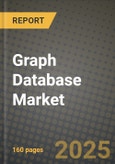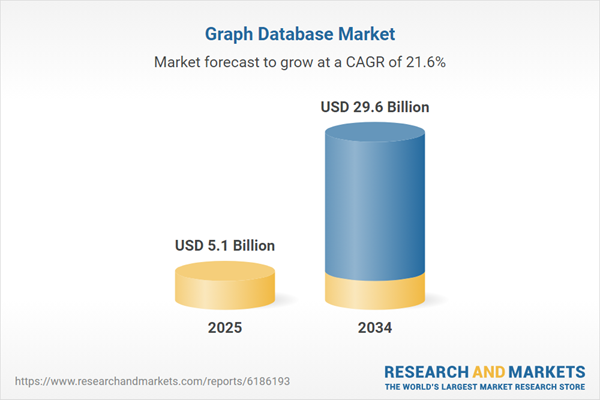The graph database market has emerged as a critical segment within the broader database management industry, driven by the increasing need for handling complex and highly connected data. These databases offer an intuitive way to represent relationships between data points, making them particularly valuable for use cases like fraud detection, social networks, recommendation engines, and knowledge graphs. Enterprises across sectors such as finance, healthcare, telecommunications, and retail are shifting from traditional relational databases to graph technologies for better performance and flexibility. As data complexity grows and real-time analytics become vital, organizations are rapidly adopting graph databases to gain deeper insights, streamline operations, and personalize customer experiences. The market is witnessing robust growth, supported by advancements in artificial intelligence, machine learning, and big data analytics, which are further amplifying the utility of graph-based models.
The graph database market experienced significant momentum as demand surged for faster and more intelligent data management systems. Leading providers like Neo4j, Amazon Neptune, and Microsoft Azure Cosmos DB expanded their offerings with enhanced AI integration and real-time processing capabilities. Open-source platforms also gained traction, enabling smaller organizations to experiment and scale affordably. Several industry verticals, particularly e-commerce and cybersecurity, heavily invested in graph databases to improve threat detection and behavioral analysis. Notably, strategic partnerships and acquisitions intensified as tech companies aimed to embed graph technology into wider enterprise software ecosystems. Innovation was not limited to capabilities alone; user-friendly interfaces and low-code integration tools made it easier for businesses to adopt and deploy graph databases without deep technical expertise. The year underscored the market’s shift from niche usage to becoming a mainstream component of enterprise data strategy.
The graph database market is poised for accelerated growth as more enterprises prioritize data connectivity and context-aware computing. Integration with generative AI, natural language processing, and advanced analytics is expected to evolve rapidly, enabling machines to understand and visualize complex relationships with greater accuracy. Enterprise IT strategies will increasingly include graph databases as a foundational component, particularly in areas such as supply chain optimization, semantic search, and autonomous systems. Additionally, regulatory compliance and data lineage requirements will push organizations to adopt graph models for transparent and traceable data flows. As edge computing and IoT generate massive streams of interconnected data, graph databases will offer a scalable solution to manage and derive value from this complexity. Emerging markets and SMEs are also anticipated to enter the landscape, supported by the increasing availability of SaaS-based graph solutions and training programs focused on graph data science.
Key Insights: Graph Database Market
- Graph-AI integration is becoming mainstream, allowing users to combine the deep connectivity of graph databases with AI’s predictive capabilities for smarter analytics and decision-making.
- Real-time graph processing is in high demand, especially for use cases in fraud detection, financial transactions, and dynamic recommendation systems.
- Open-source graph database adoption is rising as companies seek cost-effective and customizable alternatives to proprietary solutions.
- Industry-specific graph applications, such as patient data mapping in healthcare and logistics optimization, are driving sector-focused innovation.
- Improved interoperability with existing data platforms, including relational databases and data lakes, is becoming a strategic focus to ease integration.
- Surging data complexity and interconnectivity are pushing businesses to adopt graph databases for faster, relationship-centric data insights.
- Growth in AI, ML, and data science is increasing the relevance of graph models to support advanced analytics and contextual data understanding.
- Rising cybersecurity threats are prompting the use of graph databases for real-time threat detection and anomaly identification.
- Demand for personalized digital experiences in e-commerce and media is driving the need for graph-powered recommendation engines.
- Lack of skilled professionals and standardized best practices in graph database deployment is a barrier, particularly for enterprises with limited technical resources or training infrastructure.
Graph Database Market Segmentation
By Type
- RDF
- Labeled Property Graph
By Component
- Software
- Services
By Deployment Mode
- Cloud
- On-Premises
By Application Type
- Consumer Analytics
- Deep Learning
- Regulatory Compliance
- Recommendation Engines
- Identity and Access Management
- Fraud Detection
- Supply Chain Management
- Other Applications
By End-Use
- BFSI
- Retail and E-Commerce
- IT and Telecommunication
- Transportation and Logistics
- Other End-Users
Key Companies Analysed
- Oracle Corporation
- International Business Machines Corporation (IBM)
- Amazon Web Services Inc.
- DataStax Inc.
- Stardog Union Inc.
- Hewlett Packard Enterprise Company (HPE)
- Microsoft Corporation
- SAP SE
- Teradata Corporation
- Openlink Software Inc.
- MarkLogic Corporation
- Neo4j Inc.
- TigerGraph Inc.
- Objectivity Inc.
- Franz Inc.
- ArangoDB GmbH
- Blazegraph Corporation
- Cambridge Semantics Inc.
- OrientDB Ltd.
- MongoDB Inc.
- Bitnine Co. Ltd.
- Ontotext AD
- Grakn Labs Pte Ltd
- Dgraph Labs Inc.
- JanusGraph
- Expero Inc.
- Terark Inc.
- Redis Labs Ltd.
Graph Database Market Analytics
The report employs rigorous tools, including Porter’s Five Forces, value chain mapping, and scenario-based modeling, to assess supply-demand dynamics. Cross-sector influences from parent, derived, and substitute markets are evaluated to identify risks and opportunities. Trade and pricing analytics provide an up-to-date view of international flows, including leading exporters, importers, and regional price trends.Macroeconomic indicators, policy frameworks such as carbon pricing and energy security strategies, and evolving consumer behavior are considered in forecasting scenarios. Recent deal flows, partnerships, and technology innovations are incorporated to assess their impact on future market performance.
Graph Database Market Competitive Intelligence
The competitive landscape is mapped through proprietary frameworks, profiling leading companies with details on business models, product portfolios, financial performance, and strategic initiatives. Key developments such as mergers & acquisitions, technology collaborations, investment inflows, and regional expansions are analyzed for their competitive impact. The report also identifies emerging players and innovative startups contributing to market disruption.Regional insights highlight the most promising investment destinations, regulatory landscapes, and evolving partnerships across energy and industrial corridors.
Countries Covered
- North America - Graph Database market data and outlook to 2034
- United States
- Canada
- Mexico
- Europe - Graph Database market data and outlook to 2034
- Germany
- United Kingdom
- France
- Italy
- Spain
- BeNeLux
- Russia
- Sweden
- Asia-Pacific - Graph Database market data and outlook to 2034
- China
- Japan
- India
- South Korea
- Australia
- Indonesia
- Malaysia
- Vietnam
- Middle East and Africa - Graph Database market data and outlook to 2034
- Saudi Arabia
- South Africa
- Iran
- UAE
- Egypt
- South and Central America - Graph Database market data and outlook to 2034
- Brazil
- Argentina
- Chile
- Peru
Research Methodology
This study combines primary inputs from industry experts across the Graph Database value chain with secondary data from associations, government publications, trade databases, and company disclosures. Proprietary modeling techniques, including data triangulation, statistical correlation, and scenario planning, are applied to deliver reliable market sizing and forecasting.Key Questions Addressed
- What is the current and forecast market size of the Graph Database industry at global, regional, and country levels?
- Which types, applications, and technologies present the highest growth potential?
- How are supply chains adapting to geopolitical and economic shocks?
- What role do policy frameworks, trade flows, and sustainability targets play in shaping demand?
- Who are the leading players, and how are their strategies evolving in the face of global uncertainty?
- Which regional “hotspots” and customer segments will outpace the market, and what go-to-market and partnership models best support entry and expansion?
- Where are the most investable opportunities - across technology roadmaps, sustainability-linked innovation, and M&A - and what is the best segment to invest over the next 3-5 years?
Your Key Takeaways from the Graph Database Market Report
- Global Graph Database market size and growth projections (CAGR), 2024-2034
- Impact of Russia-Ukraine, Israel-Palestine, and Hamas conflicts on Graph Database trade, costs, and supply chains
- Graph Database market size, share, and outlook across 5 regions and 27 countries, 2023-2034
- Graph Database market size, CAGR, and market share of key products, applications, and end-user verticals, 2023-2034
- Short- and long-term Graph Database market trends, drivers, restraints, and opportunities
- Porter’s Five Forces analysis, technological developments, and Graph Database supply chain analysis
- Graph Database trade analysis, Graph Database market price analysis, and Graph Database supply/demand dynamics
- Profiles of 5 leading companies - overview, key strategies, financials, and products
- Latest Graph Database market news and developments
Additional Support
With the purchase of this report, you will receive:- An updated PDF report and an MS Excel data workbook containing all market tables and figures for easy analysis.
- 7-day post-sale analyst support for clarifications and in-scope supplementary data, ensuring the deliverable aligns precisely with your requirements.
- Complimentary report update to incorporate the latest available data and the impact of recent market developments.
This product will be delivered within 1-3 business days.
Table of Contents
Companies Mentioned
- Oracle Corporation
- International Business Machines Corporation (IBM)
- Amazon Web Services Inc.
- DataStax Inc.
- Stardog Union Inc.
- Hewlett Packard Enterprise Company (HPE)
- Microsoft Corporation
- SAP SE
- Teradata Corporation
- Openlink Software Inc.
- MarkLogic Corporation
- Neo4j Inc.
- TigerGraph Inc.
- Objectivity Inc.
- Franz Inc.
- ArangoDB GmbH
- Blazegraph Corporation
- Cambridge Semantics Inc.
- OrientDB Ltd.
- MongoDB Inc.
- Bitnine Co. Ltd.
- Ontotext AD
- Grakn Labs Pte Ltd.
- Dgraph Labs Inc.
- JanusGraph
- Expero Inc.
- Terark Inc.
- Redis Labs Ltd.
Table Information
| Report Attribute | Details |
|---|---|
| No. of Pages | 160 |
| Published | October 2025 |
| Forecast Period | 2025 - 2034 |
| Estimated Market Value ( USD | $ 5.1 Billion |
| Forecasted Market Value ( USD | $ 29.6 Billion |
| Compound Annual Growth Rate | 21.5% |
| Regions Covered | Global |
| No. of Companies Mentioned | 28 |









